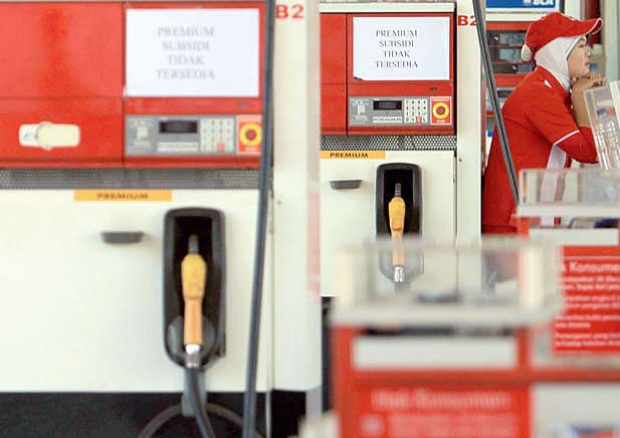Non-Subsidized Life
Translator
Editor
Rabu, 26 November 2014 13:58 WIB

TEMPO.CO, Jakarta - If Indonesia wants to avoid bankruptcy, the policy of subsidizing fuel must be ended. By the end of 2014, the funds used in subsidizing fuel is predicted to reach Rp285 trillion, almost a fifth of the amended 2014 State Budget, which is Rp1,6354.4 trillion. The rupiah, which has been weakening since 2011, has helped to contribute to the deficit.
Indonesia is no longer an oil-rich country. Our reserves are estimated to be a mere 3.7 billion barrels of oil, but the price of oil is now cheaper from oil-rich countries like Iraq, with oil reserves of 150 billion barrels. Since 2004, Indonesia has become an oil-importing country. The International Monetary Fund (IMF) predicts that by 2018, Indonesia will be importing US$63.5 billion-worth of oil.
The decision to raise subsidized fuel prices by Rp2,000 a liter must be followed up with comprehensive policies that will eventually eliminate the fuel subsidy entirely. The government must put in place the road map that can point to how we can reduce the fuel subsidy effectively. That road map can be used as a reference in reallocating the funds from subsidizing fuel to funding other, more productive sectors, like building infrastructure and establishing social safety nets.
The impact of the fuel price increase on people with marginalized incomes must be managed sustainably. For example, the missing data on the millions of people unable to receive the Healthy Family, Smart Indonesia and Prosperous Indonesia cards, must be seriously looked at and corrected.
The Jokowi government must learn from past experience on the impact of reducing the fuel subsidy. Since 1990, the government reduced the subsidy five times. The measures taken in 2005, 2008 and 2013 were deemed to have been successful, but not strong enough to manage the rising price of world oil, not helped by the depreciation of the rupiah and exacerbated by the soaring demand for more oil in the country. The government has been overwhelmed by the need to raise subsidized fuel prices faced by the serious threat of a budget deficit.
Reducing the fuel subsidy must be integrated with an overall energy policy. The policy to develop cheap energy like natural gas and alternative sources which are environmentally friendly must be carried out with a clear objective in mind. The reduction in the fuel subsidy, after all, is just a treatment to cure the symptoms of an illness. The problem is actually the increasing shortage of energy sources. If we continue to rely on fossil fuel energy, even though the subsidy is gradually eliminated, Indonesia would will still remain, for some time to come, one of the world's biggest oil importers.
The fuel subsidy is clearly an economic policy which is not sustainable. Even oil-rich countries have begun to reduce their subsidies, given the soaring cost of oil production. International oil companies like Exxon Mobil, Royal Dutch Shell and Chevron reported their worst production figures this year. It seems that the era of cheap fossil fuel has ended and to waste money on subsidizing it must also be stopped.



















